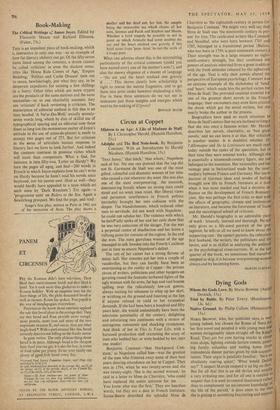Circus at Coppet
Adolphe and The Red Note-book. By Benjamin Constant. With an Introduction by Harold Nicolson. (Hamish Hamilton, 15s.) THAT hussy,' that bitch,' that whore,' Napoleon said of her. No one can pretend that the cap did not fit. Germaine de Stael was one of the most gifted, colourful and dramatic women of her time who caused a riot wherever she went. She was also, one of the most overpowering : the mannish, domineering female whom no strong man could stand and no weak man resist. Her liberal views and persistent interference in French politics inevitably brought her into collision with the despot. The blandishments, which reduced other men to servitude, did not work with Napoleon : he could not subdue her. The violence with which he habiradly spoke of her and her exile show that he was very conscious of the danger. For she was a perpetual centre of disaffection and her home a rallying point for enemies of the regime. in the end she won. The most garrulous woman of the age managed to talk Sweden into the Fourth Coalition just in time to ensure Napoleon's defeat.
The rest of her career has a strong flavour of tnusic hall. Her enemies put her into a couple of vaudevilles, but they can hardly have been as entertaining as the reality at Coppet : the private circus of writers, politicians and other hangers-on gyrating round the fantastic turbaned figure of the ugly woman with fat arms, fat legs and vast bosom spilling over the ridiculously low-cut gowns, always waiting for someone to whip up her skirt, or writhing on the ground and foaming at the lips if anyone refused to yield to her tyrannical demands. If she had been born a hundred and fifty years later, she would undoubtedly have been the television personality of the century, delighting and infuriating two continents with a stream of outrageous comments and shocking revelations. And think of her in This Is Your Life, with a harassed production staff cramming the army of men who bedded her, or were bedded by her, into one studio!
Benjamin Constant—ghat blackguard Con- stant,' as Napoleon called him—was the greatest of the men who frittered away some of their best years dancing attendance on her at Coppet. They met in 1794, when he was twenty-seven and she was twenty-eight. `She is the second woman,' he said in a letter to Mme de Charriere, 'who could have replaced the entire universe for me. . . . You know who was the first.' They arc heartless words, but they are a date in French literature. Sainte-Beuve described the splendid Mme de
Charriere as `the eighteenth century in person for Benjamin Constant.' We might very well say that Mme de Stael was `the nineteenth century in per- son' for him. The celebrated writers like Constant and Stendhal, who were born between 1765 and 1785, belonged to a transitional period. (Balzac, who was born in 1799, is pure nineteenth century.) Their strength was in a large measure an eight- eenth-century strength, but they combined the powers of analysis inherited from a great tradition with the fresh attitudes released by the upheavals of the age. That is why their novels altered the perspective of European psychology. Constant was an extreme example of the dichotomy of 'head' and 'heart,' which made him the perfect victim for Mme tie Stael. She provided essential material for one of the greatest short novels in the French language; their encounters may even have created the shock which got the novel written, but she nearly broke the author in the process.
Biographers have paid so much attention to Mme de Stael's antics that we are inclined to forget that she was once a famous writer. Mr. Herold describes her novels, charitably, as 'bad great novels,' and we can leave it at that. Her criticism is another matter. It is doubtful whether De l'Allemagne and De la Litterature are much read today outside the ranks of the specialists, but in their time they were seminal works. Although she is essentially a nineteenth-century figure, she too belonged to the transition. Her nationality and her vantage post in Switzerland made her, the inter- mediary between France and Germany. Her intro- duction of German ideas and modes of feeling brought new life to French literature at a time when it was most needed and had a decisive in- fluence on the development of French Romanti- cism. She was perhaps the first critic to deal with the effects of geography, climate and institutions on literature, and became the forerunner of "Paine and the sociological school of criticism.
Mr. Herold's biography is an admirable piece of work : leisurely, learned and thorough. He not only gives us a life-sized portrait of the pro- tagonist, he tells us all we need to know about the supporting cast : the upstart parents, the colourless first husband, the writers, the politicians and the lovers, and is as skilful at analysing the political as the psychological cross-currents. If, in the last quarter of the book, we sometimes find ourselves tempted to skip, it is because overpowering women always end by becoming bores.
MARTIN TURNELL


































 Previous page
Previous page